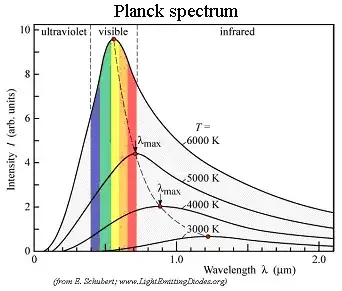I have read this question:
Miller's world would be fried by a strong flux of extreme ultraviolet (EUV) radiation. The cosmic microwave background (CMB) would be blueshifted by gravitational time dilation
There are two effects acting on a body in a deep gravity well that increase this radiation:
- Blueshift: Time going 61,000$\times$ slower would increase the observed frequency of the photons by the same amount. The energy of photons is proportionally increased. ($E=hf$)
Wouldn't Miller's planet be fried by blueshifted radiation?
There is a very nice explanation by @profrob, and I must ask a follow-up question because there are two point where I am asking for some more details how specifically gravitational time dilation would cause blueshift:
Is there an effect of gravitational time dilation that would increase all photon's frequency just because they (and the observer) are in a deep gravitational field? Can someone please explain that effect and how that works? And is it correct to say that this affects all photons, so not just CMB?
All along I thought gravitational time dilation was a effect that is only realizable when compared to another frame, far away from the black hole. If you are on Miller's planet, your clock runs normally for you. It is only when you compare it to another clock, you realize that your clock runs much slower on Miller's planet, relative to the other clock far away from the black hole. Isn't this the same way (because of relativity) with photon's energy? Photon's energy in GR is observer dependent. For an observer on Miller's planet, the photon's would be normal (i.e. visible would still be visible), it is just when you would compare it to another photon far away from the black hole that you would see the energy difference?
Now if you go with the calculations to that question, and all photons are blueshifted just because they are in a strong gravitational field (even for a local observer on Miller), then this means not just CMB, but all photons are blueshifted, including visible light photons (which would be blueshifted to non-visible range), but that means it is impossible to see on this planet.
Question:
- Can you see on Miller's planet?
